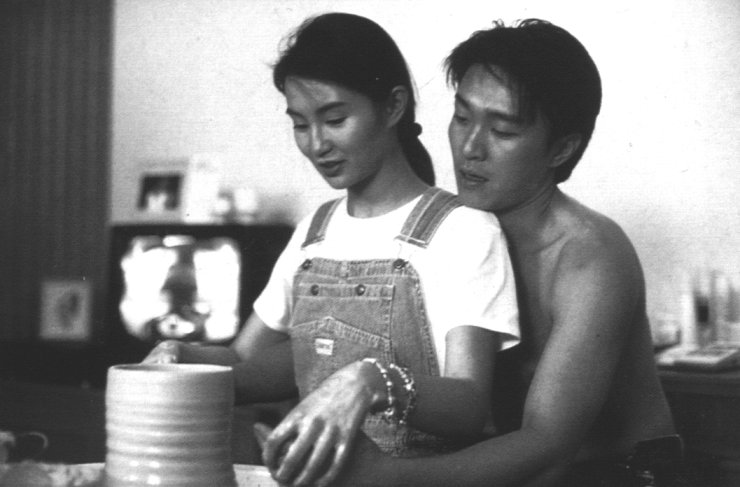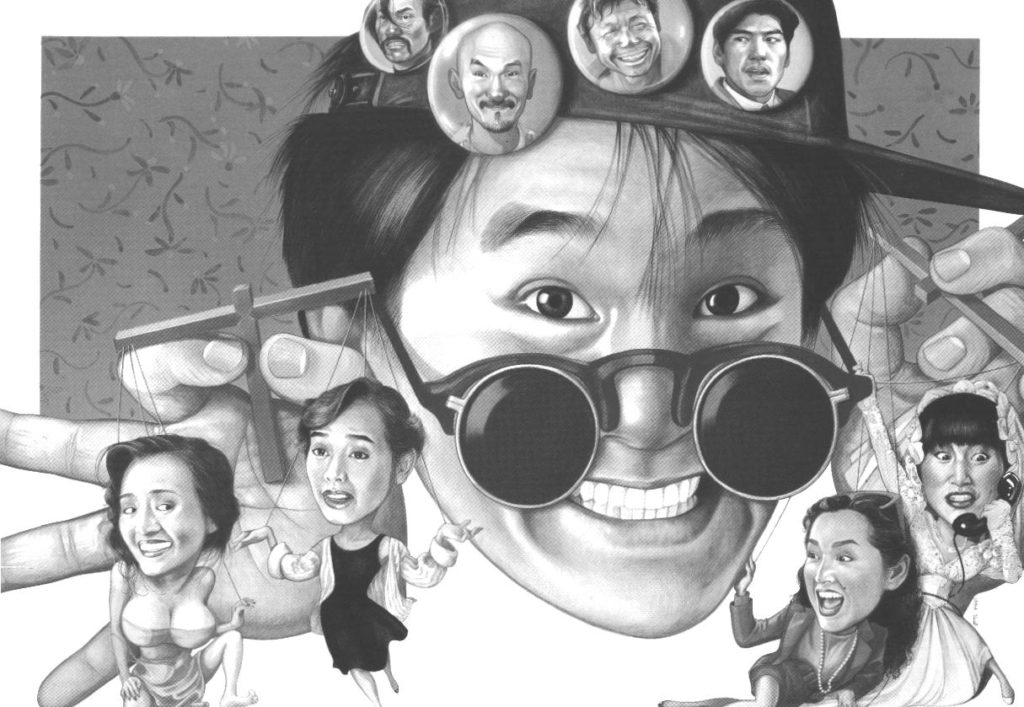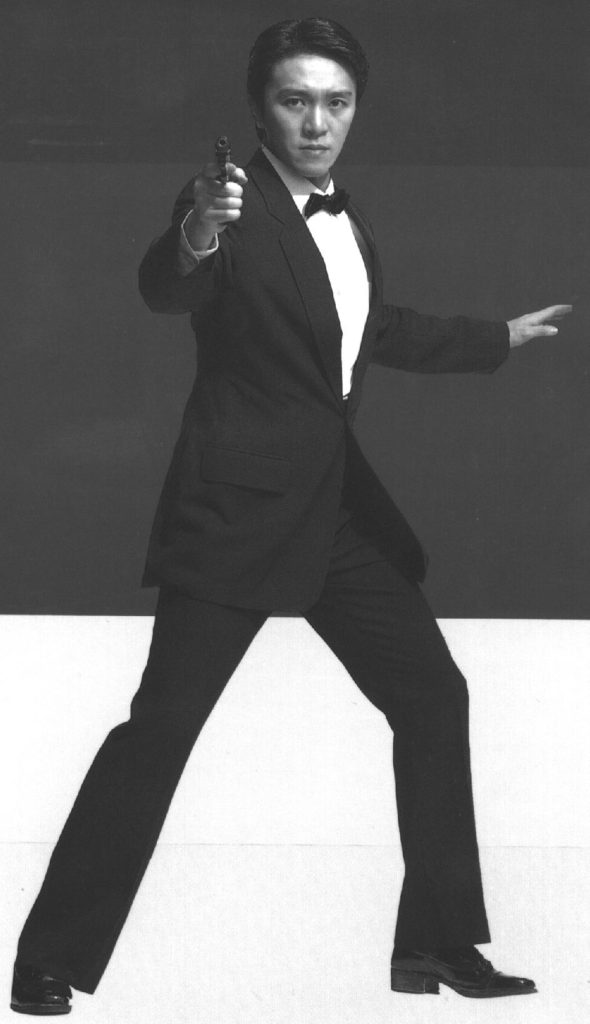Yuks and Zen…
When you mention Hong Kong cinema to most people, what they tend to think of is action films: Bruce Lee, Jackie Chan and John Woo dominate the field by some margin. Art-house fans may mention the works of Wong Kar-Wai, and sex- and gore-hounds will talk about Cat.III classics like ‘Dr. Lamb’ or ‘Sex and Zen’. However, one genre that will be almost entirely missing from such a discussion…comedy.
There are probably several reasons why it’s largely notable by its absence from the titles released in this country. Firstly, it’s a field already well-satisfied by Hollywood. Then, while movies like ‘Hard Boiled’ and ‘Heroic Trio’ take the action genre to a whole new level, it’s much more difficult for humour to do the same. Subtitled comedies also have a poor track record generally: films like ‘Les Visiteurs’ have done nowhere near as well abroad as at home, because intellectual cinema-goers tend to shy away from anything as common as jokes. But perhaps the biggest stumbling block is a perception that these films are incomprehensible to Western viewers.
This is, in some ways, fair criticism. Even the best subtitling in the world – and heaven knows, HK films are frequently a long way short of that – would be hard pushed to cope with the blizzard of verbal comedy which is often their core. You feel much as an alien would watching ‘Have I Got News For You’ – though something is clearly meant to be funny, you have no idea why. Yet at their best, Hong Kong comedies are easily the equal of those coming out of Hollywood. And even at their worst, they are certainly still a damn sight more amusing than ‘Ace Ventura, Pet Detective’, even if for no other reason than a numbing feeling of disbelief at what film-makers there apparently consider fair game.
For example, take ‘Boys Are Easy’. In other hands, a storyline about a father whose dying wish is to see his daughters married could have been a touching drama or a black comedy. However, despite a stellar cast (Brigitte Lin, Chingmy Yau and Maggie Cheung are the daughters), this one is pitched closer to ‘Kingpin’, full of utterly dumb stuff like the Triad Olympics, where the races are started with a burst of automatic gunfire, and jokes about pubic hair.

Speaking of Maggie Cheung…though her reputation in the West rests partly on her role as Jackie Chan’s much put-upon girlfriend in the ‘Police Story’ series, and partly in high-brow fare like ‘Irma Vep’, she spent a lot of her early career in severely lowbrow comedy films. One such is ‘Millionaire Cop’, which also illustrates the aforementioned tendency for Hong Kong comedies to hurl anything they can think of at the screen in the quest for laughs, regardless of logic. The central plot is sound enough – a policeman must pretend to be an industrialist’s son “with hilarious results”, as the video sleeve probably says. Bolted on are things like a transplanted hand and fart jokes, as well as Cheung, whose character turns into a nymphomaniac every time she sees a round object. I use the word “bolted” advisedly, since these elements have no connection to the main plot. While the end result is not actually very funny, as such, you certainly can’t deny its originality.
Wong Jing is undoubtedly the most prolific auteur (if that’s not too strong a word) in the field; his work-rate is legendary, even if he tends to spend as much time reading the racing papers as directing. His films tend to be the cinematic equivalents of All-Star games, one of the tenets of his film philosophy seems to be “when in doubt, add another famous actor”. Witness the previously mentioned ‘Boys are Easy’, or the similarly-themed ‘Modern Romance’, which may not have Maggie Cheung, but does have almost everyone else: Christy Chung, Carrie Ng, Sandra Ng and Chingmy Yau, to name just the female leads. For once he doesn’t short change the audience on plots: there are four separate stories here, one for each lady (superstitious, lecherous, gay and jealous respectively), charting their progress through the icebergs which are…‘Modern Romance’. Given it’s basically a chick flick – albeit a highly skewed one – it’s really rather good, though it may put you off Hong Kong women for life.
Any discussion of Hong Kong humour can only lead to one man: Stephen Chow Sing-Chi. Born in 1962, he started off as a kids’ TV presenter, alongside another future star, Tony Leung, before moving into dramas, and eventually feature films. At the box-office in Hong Kong, he’s only just behind Jackie Chan, and well ahead of Chow Yun-Fat, with his “mo lei tau” (make no sense) films regularly cleaning up. Unlike his colleagues, the Western release of his work has been very limited, largely to minor movies, seeping out almost unheralded, such as ‘Legend of the Dragon’, a film most notable for a cameo by snooker ace Jimmy White. Chow’s often compared to Jim Carrey, with some justification, although his best-known characters are more sympathetic and restrained. Both do well playing “the little guy”, up against, and often getting the better of, authority figures, enmeshed in situations well beyond their control. It’s certainly possible to see Carrey in some of Chow’s roles, and indeed ‘God of Cookery’ has been slated for a Hollywood remake.
Unlike Carrey, often more irritating than endearing, even Chow’s less successful films demonstrate his abilities. ‘All’s Well Ends Well’, for instance, is compelling evidence that HK comedy does require skill. In this ensemble piece there’s a marked contrast between bits that, while trying very hard to be funny, end up as mere frantic mugging, and sequences involving Stephen Chow and (again!) Maggie Cheung, which are several orders of magnitude better. It chronicles the obsessions, problems and entanglements of a family, valid contenders for the title of World’s Most Dysfunctional, as they progress towards the happy ending given away by the title. Large chunks border on the painful to watch, yet it’s redeemed by Chow and Cheung as a lecherous DJ and his movie-obsessed girlfriend, leading to parodies ranging from ‘Ghost’ to ‘T2’. It’s typical that weaker movies like this still have scenes which are laugh-out loud, though even I must confess there are exceptions: to these Western eyes, his ‘Chinese Odyssey’ films were completely incomprehensible. I suspect an appreciation of Oriental myth and legend would have been helpful.
Chow’s talents don’t stop at comedy. Earlier films like ‘Triad Story’ and ‘He Who Chases After the Wind’ show he can turn in perfectly decent performances in dramatic roles, without stealing scenes or over-acting. But it’s in comedy that Chow seems to be at his best, and it is there that his greatest successes and most memorable movies can be found, even if, for the moment, he remains one of Hong Kong cinema’s best kept-secrets. Unsurprisingly, given the length of his filmography, I can’t claim to have seen all of his work – of the twenty-plus which I have, here are my personal favourites.

God of Gamblers III: Back to Shanghai (Wong Jing) – Barely related to the Chow Yun Fat classic, Stephen Chow is the ‘Saint of Gamblers’, who gets sucked back in time when his paranormal powers clash with those of the villains. Though this takes a while to get going, it’s a great set-up, with little quirks like his mobile phone not just working in 1937, but letting him call people in the 90’s for advice as he battles gangsters and strives to win the heart of a fair lady – or failing that, her mentally retarded twin sister… [Both played by, of all people, Gong Li, better known for art-house stuff like ‘Raise the Red Lantern’. Hell, this is a Stephen Chow film!] The sheer volume of good humour on display means this is certainly more enjoyable than Chow Yun Fat’s half-baked sequel, though it may fall short of the original film. Supreme moment: Chow hides a venomous snake by wearing it as a cool leather tie.
Magnificent Scoundrels (Lee Lik-Chi) – One of those, “Oh God, where to start?” films, largely thanks to an amazingly constructed plot, virtually made up on the fly. The basic thread concerns two teams of swindlers, respectively impersonating the owners of a vacant house, and pretending to be rich visitors. Each thinks the other is legit, and is trying to rook them out of as much as possible. The mental duelling between these opposing charlatans is the heart of the film, and is a delight to watch. In comparison, the opening and climax are somewhat lack-lustre; though the former can perhaps be excused as necessary scene-setting, the latter is a disappointment. But it’s hard to complain given the enormous amount of invention on view in the rest. Supreme moment: Amy Yip vomiting down a guy’s throat.
Love on Delivery (Lee Lik-Chi) – This showcases Chow’s talent for the character-driven; nobody plays the luckless underdog like him. Here, he’s a fast-food delivery boy, who has the misfortune to fall in love with a girl who is also being pursued by a martial-arts master. So Chow tries to learn to fight, only to fall in with a con-man; typically, he ends up learning anyway. Oh, and he can only use his skill when wearing a Garfield mask, so it’s not much use for impressing his lady, especially given all the copycats (hohoho) who follow in his wake… The film is crammed full of glorious stupidity, great characters and ends with a brilliant display where Chow tries to survive a three-round deathmatch, by not fighting his opponent. A super piss-take of the usual macho heroics, this is Very Zen, yet also Very Stephen Chow. Supreme moment: Chow and his pacifist-fu.
From Beijing with Love (Stephen Chow Sing-Chi) – Never mind Austin Powers, this is the Bond spoof to end them all, with Chow coming out of ‘retirement’ as a butcher, to safeguard China’s national riches. From an inspired parody of Bond credits (not for the last time – ‘Forbidden City Cop’ does the same thing), it’s a blizzard of gags, the best revolving around gadgets such as the shoe which cunningly conceals…a hairdryer. Chow is perfect as the deadpan ex-agent, while Anita Yuen covers both good-girl and bad-girl bases. There are many great sequences: the use of porn as an anaesthetic, an escape from a firing squad and his piano-playing all stick in my mind. Perhaps most surprising, it works almost as well viewed as an action film: like the Bond movies, it builds with a good sense of pace, towards a climax where Chow’s butchery skills are invaluable. For a directorial debut, it’s an amazing piece of work; truly, nobody does it better. Supreme moment: the solar-powered torch.
Stephen Chow Sing-Chi Filmography

- 1987
Just Heroes - 1988
Dragon Fight
Faithfully Yours
Final Justice
He Who Chases After the Wind
The Last Conflict - 1989
Thunder Cops & Thunder Cops 2
The Unmatchable Match - 1990
All for the Winner
Curry and Pepper
God of Gamblers II
Legend of the Dragon
Look Out, Officer!
Love is Love
Lung Fung Restaurant
My Hero
Sleazy Dizzy
Triad Story
When Fortune Smiles - 1991
The Banquet
Crazy Safari
Fight Back to School
Fist of Fury 1991 & Fist of Fury 1991 II
God of Gamblers III: Back to Shanghai
Magnificent Scoundrels
Top Bet [Cameo]
Tricky Brains - 1992
All’s Well, End’s Well
Fight Back to School II
Film Without Bounds: the New Hong Kong Cinema
Justice, My Foot!
King of Beggars
Royal Tramp & Royal Tramp II
Thief of Time - 1993
Fight Back to School III
Flirting Scholar
Mad Monk
My Hero 2 [Cameo] - 1994
- From Beijing with Love [+ Dir & Writer]
Hail the Judge
Love on Delivery - 1995
A Chinese Odyssey Part One: Pandora’s Box
A Chinese Odyssey Part Two: Cinderella
Out of the Dark
Sixty Million Dollar Man - 1996
Forbidden City Cop [+ Writer]
God of Cookery [+ Prod, Dir & Writer] - 1997
All’s Well, End’s Well ‘97
Lawyer Lawyer - 1998
The Lucky Guy - 1999
Gorgeous [Cameo]
King of Comedy
